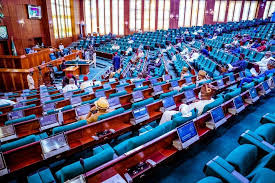Last week, an Ad hoc committee of the House of Representatives, charged with a mandate to investigate and unravel the alleged abuse of taxes received by the Tertiary Education Trust Fund (TETFUND), amounting to about N2.3 billion from 2011, engaged the agency at an investigative hearing. JOSHUA EGBODO writes on the issues therefrom
The mandate
On Tuesday July 4,2023, the House of Representatives through a resolution gave mandate to an Ad hoc committee to investigate the reported abuse of N2.3 trillion tertiary education tax by the Tertiary Education Trust Fund (TETFund) from 2011. It was fallout of a motion jointly sponsored by the trio of Olusola Fatoba, David Fouh and Zakari Nyanpa.
Tertiary education tax was introduced as a special corporate intervention to provide specialised funding for higher education in Nigeria, including capital projects, research and development, among others, necessitating the creation of TEFUND through an Act of the parliament enacted in 2011 as administrative agency for that purpose.
By the Act, public limited liability companies operating in the country are under obligation to pay 2.5 percent of their profits as education tax to TETFUND.
Concerns of motion sponsors
Fatoba who was the lead sponsor in moving the motion on behalf of his colleagues said since the establishment of TETFUND trillions of naira has been generated, but that the agency had been allegedly “reputed for numerous financial abuses in its operations, award of contracts and execution of projects”.
According to him, “The standard operating procedure within the fund is porous and does not create a platform for proper supervision of projects domiciled with tertiary institutions, with disbursements of funds happening without tracking and payments being made despite the failure of contractors to achieve milestones required for such payments. These abuses, actions, inactions and infractions have resulted in the misappropriation of funds and unjust enrichment of funds worth about N2.3 trillion.”
He said if urgent steps are not taken to investigate the allegations, the “decay of the tertiary education system will continue to increase”, adding that prevailing situation would continue to lead to “strikes by academic workers, substandard institutions, lack of faith in the system, migration of talented youths and total collapse of the education system arising from gross abuse of laudable special intervention programmes and aspiration of the president to provide opportunities to young people through quality tertiary education”.
The House was to later set up an Ad hoc committee for the investigation, under the chairmanship of Hon. Oluwole Oke.
Damning revelations
At commencement of the investigative hearing last Tuesday, TETFUND, through its Executive Secretary, Mr Sonny Echono, in the opinion of many analysts shocked the panel and Nigerians at large with disclosures that nothing was missing as alleged, but that rather, a substantial part of the generated revenue had been borrowed by the federal government, in addition to other challenges he said the agency was facing.
In specific, he disclosed that the Federal Government was owing the Fund the sum of N323 billion. He said the actual sum generated from education tax from 2011 to 2022 was N2.476 trillion, out of which the Federal Inland Revenue Service (FIRS) retained N99 billion as cost of collection.
He disclosed that the Federal Government since 2013 had borrowed N371.3 billion from the Fund out of which it has paid only N48 billion so far.
“We do have challenges but these challenges have nothing to do with fraud. They are basically issues of governance and I would start by explaining what the challenges are; First in absolute terms so we have a clear picture of what we are talking about, from the year 2011 to 2022 total education tax collected by the FIRS as presented to us in their documentations, as confirmed from the statements we received from the Central Bank of Nigeria (CBN) which we have also attached for the Committee to peruse is N 2, 476, 733, 181, 679.75.
“Out of this amount, a total sum of N99 billion were retained by FIRS as cost of collection, leaving a balance of N2.37 trillion. So the total fund that had hit education pool account at the CBN is N2.3 trillion from 2011 to date.
“However the FG over time in the course of governance and to meet pressing needs, has borrowed funds from these accounts. The total borrowing is approximately N371.339 billion. These borrowings happened over time and most of the borrowings started in 2013.
“The Federal Government acknowledged that it was borrowing and we have full documentation of this and all the correspondences that accompanied it. Other borrowings since then are being tabulated and given to you. We did secure presidential approval for the refund of this borrowing since 2015 and the Federal Government has been refunding albeit in piecemeal.
“To date total borrowing is over N371 billion. But total repayment to this date is about N48 billion. Last year 12.8 billion was given to us, this year another 12.89 billion was given to us.They are just paying. God knows how long this will take to defray the principal amount”, he explained, urging the Ad hoc Committee to assist the Fund in recovering the money.
Forex challenges against foreign scholarships
The Executive Secretary also informed the Hon. Oke-led panel that consultations were ongoing to suspend foreign scholarships as a result of the current exchange rate, explaining that some of the tax comes in foreign currencies to CBN but when it is time to pay fees for scholars abroad, the apex bank insists on TETFUND source forex by itself.
“We operate a system where our forex is being sold on our behalf at an official rate and we apply like anybody else to get it, sometimes it leads to additional cost,” he said, urging the committee to intervene and compel the CBN to allow TETFUND access forex to pay fees as at when due.
“Currently as I speak, we are in consultations with all our stakeholders to suspend foreign training for a year or two. This is because of the recent exchange rate adjustments, we are unable to continue based on our disbursement guideline. The money we allocated in naira cannot cover the dollar requirement for training.Those who are currently there, we now need more naira to pay for the dollar that is required for their annual fees. We are trying to put a hold”, he noted.
He stated further that the agency had earlier decided that only limited courses where they do not have capacity in Nigerian institutions will qualify for foreign sponsorship. “Most of our training now will be done locally through our experienced, first-generation universities and other specialized universities based here. This way we can retain our resources in house and cope with the change of foreign exchange variation.
Absconding trainees
He further told the panel that there was also the problem of sponsored persons refusing to return back to the country in defiance of the guidelines preceding award of the scholarships. “Some of the scholars that has been sponsored, unpatriotically when they go, they enjoy our scholarship, acquire a higher degree, they refuse to come back, it has become a major crisis.
“We are working with the staff unions for stringent and effective measures to be taken; currently before you are sponsored, you are made to sign a bond. The scholarship requires that you will come back. It is required that you have a guarantor and in many cases the guarantor has suffered undue hardship because when you disappear, we hold the guarantor to pay all the money expended on your behalf but that has not been effective.
“We believe that a system where we work with our embassies and the institutions, we can enforce the repayment for those who insist they will not come back. If they don’t, we will declare them ‘persona non grata’. We will write to the embassies and they will make it available to those countries and they will not be able to get jobs. They will be seen as fugitives of law from their countries.
“We may have to take that hard stand because the numbers are alarming. We just checked about 40 institutions and over 137 absconders and the review is ongoing. It is a huge number that we cannot afford and so we will be seeking your support to strengthen some of the existing regulations to ensure that those who benefit from this programme must come back.
“We are not against people looking for greener pastures but do so on your own, not through our scholarship or through our sponsorship,” he said.
What next?
With the damning revelations, the committee had seemingly been boxed to a corner. Can its recommendations, subject to adoption of the larger House, possibly to compel the Federal Government to pay the borrowed funds back to coffers of TETFUND as soon as necrssary? Will the CBN heed a call for unhindered access to forex for a smooth payment of fees for foreign scholarships? How effective will the new rules being designed to prevent absconding of sponsored trainees? Were there missing funds as alleged?
Answers to these questions, and many more are being expected, as the panel concludes its probe and report back as mandated by the House. Its Chairman, Oke had vowed that the committee get to the the root of all issues involved.




